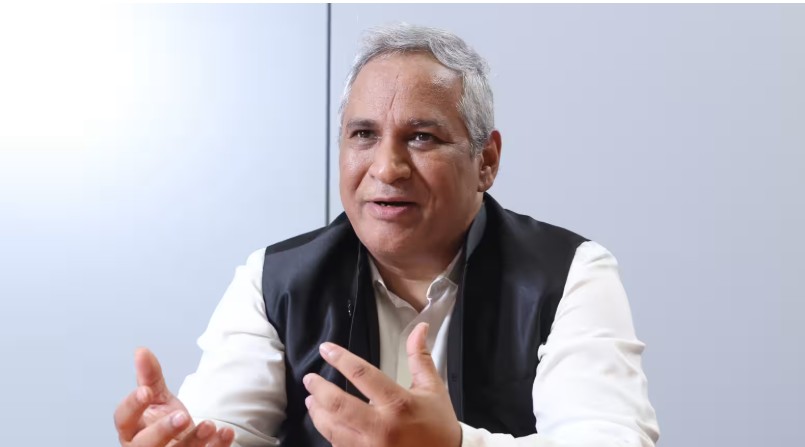Indian impact investor Aavishkaar eyes new deep tech equity fund- Nikkei Asia
Aavishkaar is one of India’s oldest and largest impact investors. Founder and vice-chairman, Vineet Rai, has plans for a new equity fund focused on India and deeptech. (Photo by Yuji Murakami)
TOKYO — One of India’s oldest and largest impact investors, Aavishkaar Group, aims to use technology such as artificial intelligence to ease economic disparities in low-income communities, with plans to launch a new equity fund centered on deep tech.
Established in 2001, Aavishkaar is involved in venture capital investment, microfinance and consulting services, all of which focus on the idea of impact — a strategy that seeks to create positive social or environmental changes, while also generating financial returns.
The group’s assets under management (AUM) have reached $1.4 billion, including its venture capital arm, Aavishkaar Capital, which has an AUM of around $550 million. It currently operates seven equity funds and one credit fund.
The funds invest in early- to growth-stage companies, such as small and medium-sized enterprises (SMEs). “We work with low-income communities and we try to create economic opportunities for them,” said group founder Vineet Rai.
“We look at technology as an essential enabler to make a difference,” Rai said in an exclusive interview with Nikkei Asia. Technology like AI “can make a low income-person with less capability and less exposure as good as anyone,” he said, adding, “We focus on how to unleash entrepreneurial energy to solve big problems of the world.”
Aavishkaar has so far made close to 90 investments across its eight funds that have generated impact, such as providing affordable financial services and reducing carbon dioxide emissions. These efforts have reached roughly 136 million people as of December 2024, 70% of whom are in India, according to Rai.
While 80% of the investments have been deployed in India, the country has also become a key source of capital for Aavishkaar, providing around 50% of the venture capital fund’s total assets.
Outside of India, British International Investment, a development finance institution backed by the U.K. government; German bank KfW; and the Dutch entrepreneurial development bank FMO have contributed to Aavishkaar’s funds. From Japan, Mitsui Sumitomo Insurance Venture Capital and Sophia University are investors.
“India will remain one of the fastest growing economies in the world, thanks to a strong domestic market and growth in population,” said Rai. As the country becomes a “service provider to the world,” investments in advanced technologies will accelerate, he said, adding, “If people are looking for a density of talent, capability and capital, then I think India is a great place.”
Aavishkaar plans to double down on its tech investments as it prepares to launch its eighth equity fund next year. “It will purely focus on India, deep tech and impact,” Rai said, explaining that the fund will aim to be around $200 to $250 million in size. Vineet Rai, founder of Aavishkaar Group, speaks to Nikkei Asia in Tokyo.
“There are many types of deep tech, but we are considering a few types … such as deep tech for climate, including green hydrogen companies. Agriculture and waste management are also areas of interest,” he said.
In the future, Aavishkaar hopes to create an Africa equity fund, as well as a climate fund for Southeast Asia.
Last month, the Indian group secured a $40 million investment from the Japan International Cooperation Agency (JICA), a semigovernmental organization operating under the Foreign Ministry, for its Global Supply Chain Support credit fund.
The credit fund aims to help SMEs across the Global South, where important supply chains, from food to manufacturing, are located. While there are global moves to upgrade supply chains, most smaller businesses in developing countries lack the capital to make their supply chains more sustainable and traceable.
The “reciprocal” tariffs imposed by U.S. President Donald Trump have also caused countries and businesses to reevaluate their trade strategies and supply chains.
Rai said Trump’s tariffs have so far “benefitted” some of the companies Aavishkaar invests in, as “some of our competition has gone [OUT] of the market.”
“While tariffs impact everyone, due to our regional strategy, we have some advantage as our apparel and agri investments that are exporting to the U.S. are positioned in African countries, where levies are not as harsh, and we are still competitive.”
Aavishkaar is looking to “raise more money from Japanese clients” in the future, Rai said. “We have been in conversation with Japanese corporates and banks, as well as with European or global financial institutions.”
Rai went on to say that the venture capital is not just interested in raising money from Japan but also “genuinely interested in creating a base in Japan” by bringing some of its other capabilities, like its advisory firm, to the country.
Read more in Nikkei Asia (Subscription Based) –Indian impact investor Aavishkaar eyes new deep tech equity fund – Nikkei Asia

